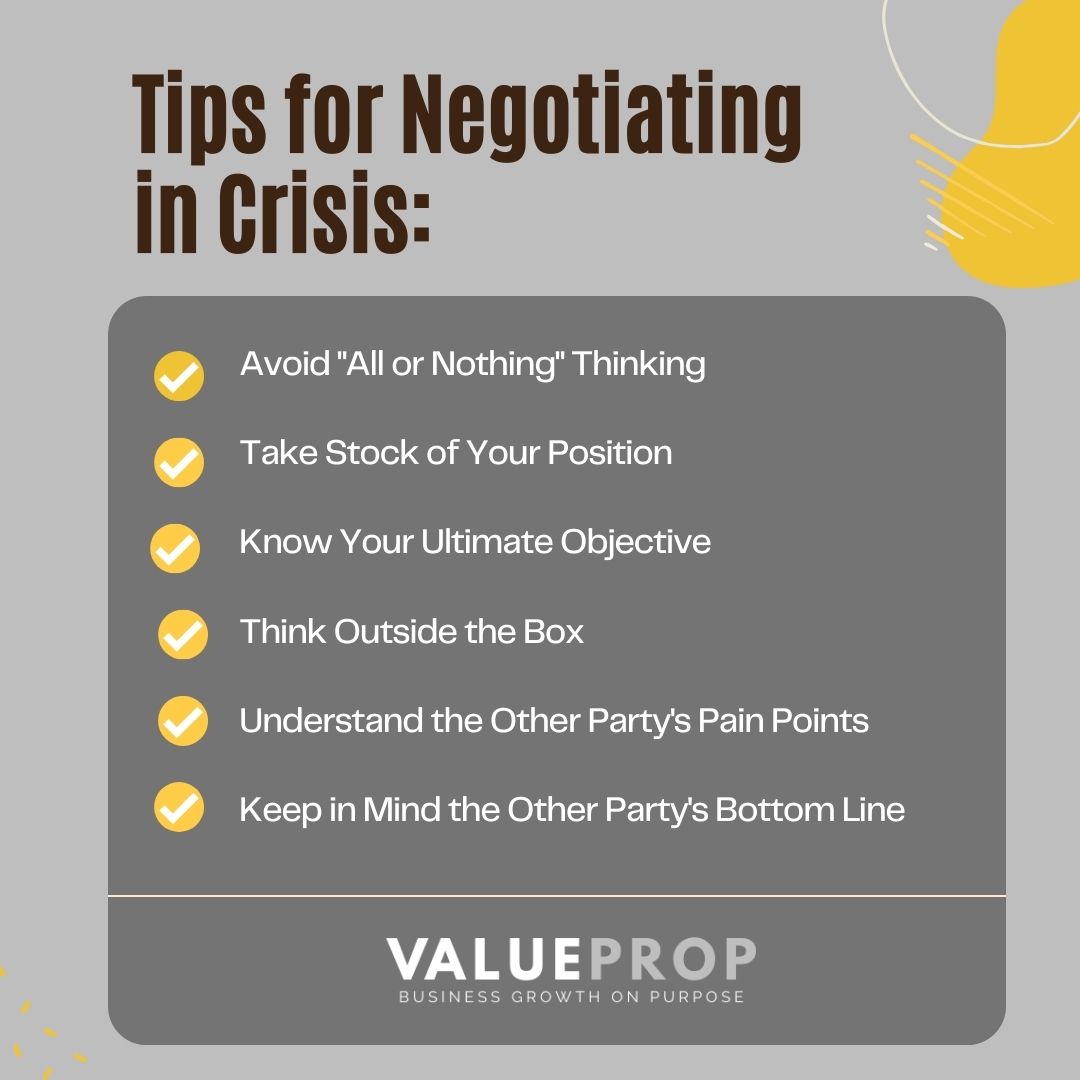How to Negotiate in Crisis—The Right Way
Apr 01, 2020
With the world in crisis, business owners find themselves negotiating on every front – from done deals that became undone to rent concessions. Here’s how to negotiate a win-win in crisis.
Negotiating is almost always a pain. There are always many feelings to navigate, wishes and desires to be fought for. Negotiation is never a relaxing activity—especially in a crisis like the pandemic we currently find ourselves in.
In a crisis, time gets shorter. The stakes get higher, the market gets less forgiving, and everyone is feeling a pinch—and as we’ve seen from the hoarding of toilet paper, everyone begins to look out for Number One!
But, now more than ever, you will find yourself doing a lot of negotiating: you’ll be negotiating to save a deal; rent with your landlord; pay cuts with your leadership; deliveries with your suppliers; or other commitments with your clients.
And negotiating poorly could cost you greatly.
So how do you get through it? How can you negotiate well in crisis? We’ve got some tips for you.

Avoid “All or Nothing” Thinking
Negotiating in crisis-mode often causes people to get more extreme in their demands. People dig their heels in and are less likely to bend. With emotions running high, it’s easy to fall into an “all-or-nothing” mindset.
Instead, take a few deep breaths. Remember that panic can cause people to think irrationally—including yourself. Before you even get on that negotiation call, spend some time thinking about what you do have and the things you are grateful for. Beginning from a place of calm will help you keep your head on straight.
Take Stock of Your Position
Knowing your position gives you insight into your points of leverage. What are you worth to your clients? What are you worth to your suppliers? Are you one of the longest-term tenants your landlord has?
If you’re the biggest player in the room, obviously you have leverage. Good for you! But even if you aren’t, you can still find points of leverage that matter to the other party. This is where knowing your value proposition and differentiation can help. What is unique about how you do what you do? How can you highlight that in your negotiations to add value to the other party?
By knowing your position, you can gameplan how much runway you have with your counterparty. If you’re not that valuable, you’ll have to find other ways to leverage yourself or dial down your expectations of what you can ask for.
Know Your Ultimate Objective
In a perfect world, you’d get everything you’d ask for in a negotiation—but those chances are slim on a good day, and even slimmer in a crisis. Before you get on that call, establish what is MOST essential for you to get out of the conversation.
Is it that last order? A reduction in rent? A commitment to continuing employment? If you have a few top priorities, force yourself to rank them ahead of time.
Ranking your priorities gives you clarity when you’re in the heat of the moment and the other party is throwing alternatives your way. It also allows you to let go of lower-priority asks.

Think Outside the Box
Plan ahead for the gridlock. If none of your ultimate objectives are getting through, think creatively about a backup plan. Often times, I’ve seen owners give away too much or not get anything because they were too stringent on getting what they wanted.
Of course, you don’t have to take whatever they’re offering you in this negotiation. You need to know your bottom line to avoid “giving away the store”. But rather than walking away with nothing, think about what else can you gain.
For example, a positive testimonial of your services? A short-term, lower fee contract? A long-term subscription for replacement parts at a lower price? The possibilities are endless – so take TEN MINUTES and ask yourself this question: “What else can they do for us that would help us win or do better?”
Understand Their Pain Points
We’re all experiencing uncertainty and feeling a pinch. How do you think the other party is hurting? If you have a long relationship with them, this is a little easier to figure this out.
But even if you don’t, you can do some research on the company and their market and make an educated guess about what their pain points might be. Knowing this will:
- Help them feel heard in the midst of your negotiation
- Gives you the opportunity to meet their need—and make yourself even more valuable.
Keep in Mind Their Bottom Line
Along the same line of knowing their pain points, you’ll also want to know their bottom line. What do you think they’d be willing to live with? What do you think would be “over the line” for them?
While they may be walking into this negotiation with their own prioritized “wish list”, there’s almost always some wiggle room in what they’re willing to concede or live with. If you have a good understanding of what is their priority and what’s not, then you may discover some new areas where you can come together to create a win-win.
Negotiating the Right Way
Negotiating in crisis comes down to keeping calm, knowing what is most important to you, planning what you’re willing to be flexible on, and putting yourself in the other party’s shoes.
Doing this gives you clarity about what you want to get out of the discussion, what you think they want to get out of it and gives you a range of options for both parties, so you can structure and lead a negotiation conversation more productively than ever before—even in a crisis.
Please let me know what else has worked for you in negotiations.


